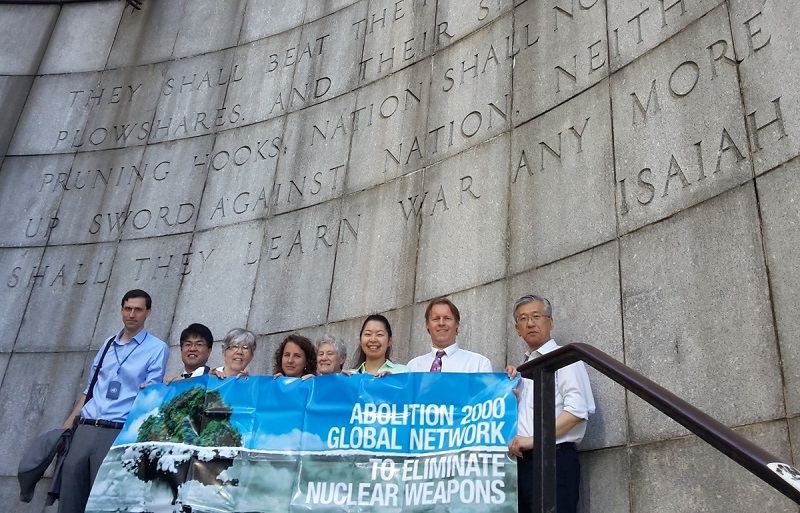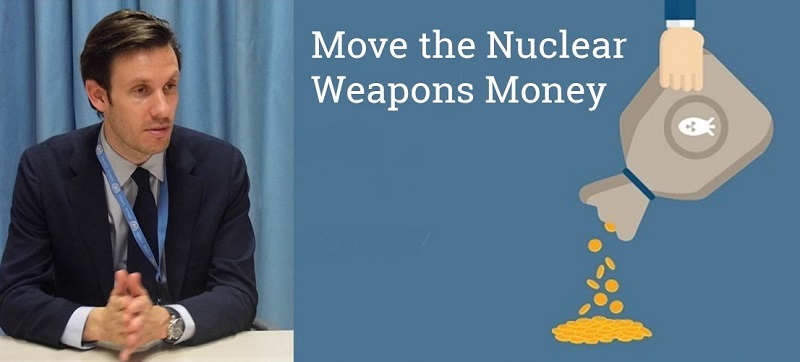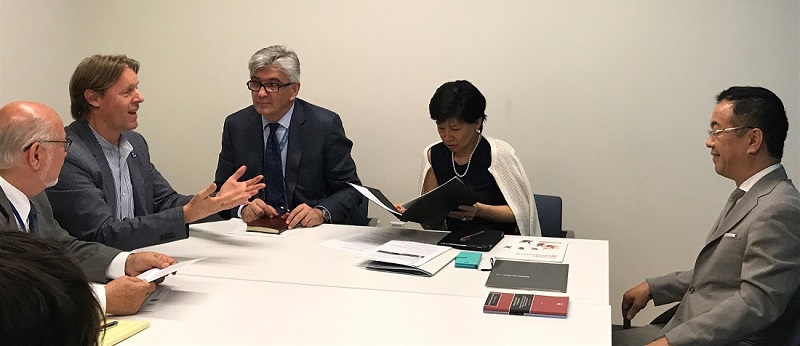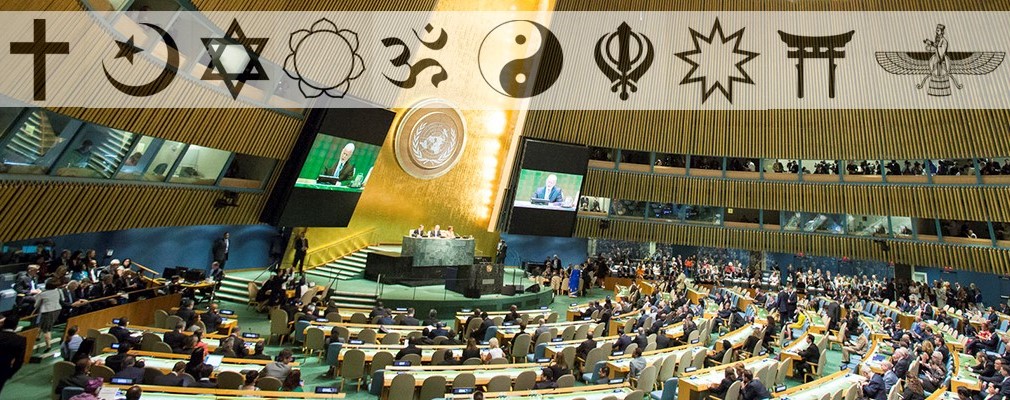On July 7, 2017, the United Nations adopted a Treaty on the Prohibition of Nuclear Weapons (‘ban treaty’) following negotiations over 5 weeks during March, June and July.
122 countries voted in favour of the treaty, demonstrating the clear and unequivocal acceptance of the majority of UN members never to use, threaten to use, produce, possess, acquire, transfer, test or deploy nuclear weapons. The treaty will be open for signature on September 20 and will enter-into-force once 50 States ratify.
The new treaty reflects the values and beliefs of the major religions and faith-based communities to treat others with respect, promote non-violence, protect our world for current and future generations, and base our security on an ethical approach emphasizing conflict resolution and the common good.
Indeed, the preamble of the treaty specifically acknowledges ‘the ethical imperatives for nuclear disarmament and the urgency of achieving and maintaining a nuclear-weapon-free world, which is a global public good of the highest order, serving both national and collective security interests.’
Faith-based communities and the ban treaty negotiations
The United Nations decided to hold the negotiations on a ban treaty following a series of UN open ended working group (OEWG) meetings in 2013 and 2016. Religious and other faith-based communities played key roles in the OEWG process and in the negotiations themselves.
Many faith-based communities, for example, promoted the 2013 OEWG by participating in the Open the Door campaign. This involved civil society events around the world doing symbolic actions to ‘open the door to a nuclear-weapon-free world.’
In 2016, Religions for Peace, in cooperation with Mayors for Peace and Parliamentarians for Nuclear Nonproliferation and Disarmament, gathered endorsements globally for a joint statement of religious leaders, mayors and parliamentarians ‘A Nuclear-Weapon-Free World: Our Common Good‘ and then presented this to the OEWG negotiations to encourage the governments to take action.
In June-July 2017, during the ban treaty negotiations in New York, faith-based communities held a daily vigil at Isaiah Wall just outside the United Nations, to reflect and pray for a successful outcome to the negotiations. There was also a special screening in the UN Trusteeship Council Chambers, of the new documentary The Nuns, The Priests and the Bomb, directed by Helen Young.
And for both the OEWG and ban treaty negotiations, faith-based communities observed the negotiations, made interventions, held side events, met with government delegations and sent messages to their governments encouraging them to take action to prohibit nuclear weapons.

Ban treaty – impact on the nuclear armed and allied countries
The nuclear-armed and allied States opposed the treaty and none are likely to join. As such they are not bound by its provisions, and will not be directly affected by it.
However, the new treaty could be used to impact on the policies and practices of the nuclear armed States and their allies in two key ways:
- by stimulating nuclear weapons divestment action by States parties to the ban treaty, and also by cities, universities, religious institutions and individuals around the world;
- by putting political pressure on the nuclear-armed and allied States to adopt nuclear risk reduction and disarmament measures, including through the Non-Proliferation Treaty process and at the 2018 UN High-Level Conference on Nuclear Disarmament (UNHLC).
Faith-based communities could advance these initiatives (nuclear weapons divestment and the 2018 UNHLC) in their own institutions and countries, especially in conjunction with commemorations of Hiroshima and Nagasaki Days (Aug 6 and 9), International Day for Peace (Sep 21) and the International Day for the Total Elimination of Nuclear Weapons (Sep 26).
The Abolition 2000 Inter-faith Working Group, which met at the UN during the ban treaty negotiations, provides resources, action ideas and a forum for faith-based communities around the world to advance nuclear disarmament, including through implementation of the ban treaty and promotion of the 2018 UNHLC. Contact info@baselpeaceoffice.org if you would like to join.
Nuclear weapons divestment
The nuclear prohibition treaty could impact on nuclear weapons policies if it results in divestment by States parties and others from corporations manufacturing nuclear weapons and their delivery systems.
These corporations (there are about 20 of them globally) are a major driver of the nuclear arms race. They actively lobby their parliaments and governments to continue allocating exorbitant budgets to nuclear weapons (over $100 billion annually by the nine nuclear-armed States). And they support think tanks and other public initiatives to promote the ‘need’ for nuclear weapons maintenance, modernization and expansion.
Many of the countries supporting the nuclear prohibition treaty have public funds (such as national pension funds), and banks operating in their countries, that invest in these corporations.
If a number of States Parties to the treaty, encouraged by their parliamentarians and civil society, decide to prohibit investments in nuclear weapons corporations as part of their national implementation measures, this could highlight the unethical corporate practice of manufacturing such weapons, damage the standing of such corporations and constrain their lobbying power. See Ban treaty opens the door to global nuclear weapons divestment campaign.

A coalition of NGOs (Basel Peace Office, International Peace Bureau, PNND, UNFOLD ZERO, World Future Council and others) has launched the Move the Nuclear Weapons Money campaign which includes actions to dramatically increase the number of countries divesting from nuclear weapons corporations, focusing on those countries joining the nuclear prohibition treaty.
The campaign also supports nuclear weapons divestment by cities, universities and religious institutions in nuclear-armed and allied countries.
This divestment campaign is coupled with campaigns in the nuclear-armed States to drastically cut nuclear weapons budgets and re-direct these resources into economic, social and environmental need, such as promoting renewable energy and protecting the climate.
For more information see Move the Nuclear Weapons Money: A handbook for civil society and legislators’ or join the Abolition 2000 working group on Economic Dimensions of Nuclearism.
The ban treaty and the 2018 UN High-Level Conference on Nuclear Disarmament
Nuclear armed and allied States have easily dismissed the ban treaty as not relevant to them and which they can ignore. It is not so easy for them to ignore the 2018 UN High-Level Conference on Nuclear Disarmament (2018 UNHLC).
There is a general expectation (from media, parliaments, civil society and other governments) that governments will participate in UN high-level conferences at the highest level, i.e. by the President or Prime Minister, and that these conferences will deliver concrete outcomes.
As such, recent UN high-level conferences have been very successful, resulting in the adoption of the Sustainable Development Goals (2015), Paris Agreement on Climate Change (2016), NY Declaration on Refugees and Migrants (2016) and Our Ocean: Our Future, the 14-point action plan to protect the oceans (2017).
The ban treaty could be used to put pressure on nuclear-armed and allied countries to adopt nuclear-risk-reduction and incremental disarmament measures at the 2018 UNHLC, and possibly even to agree on a framework to achieve the elimination of nuclear weapons.
Already the 56 member parliaments of the OSCE Parliamentary Assembly (which includes the parliaments of four nuclear armed and all the NATO countries) have called ”on all participating OSCE States to participate in the 2018 UN international conference on nuclear disarmament at the highest level, to include parliamentarians in their delegations to the conference and to pursue the adoption of nuclear risk reduction, transparency and disarmament measures at the conference.” (Tblisi Declaration, adopted July 5, 2016)
The Inter-Parliamentary Union, comprising 170 member parliaments, has also given support for the 2018 UNHLC.
The 2018 UNHLC could also be an opportunity for non-nuclear countries to announce their ratification of the nuclear prohibition treaty. If 50 ratifications are achieved by the 2018 UNHLC, then this could be the occasion to announce its entry-into-force.

On June 30, representatives of key inter-faith networks (Religions for Peace, United Religions Initiative and the Parliament of the World’s Religions) joined PNND and Mayors for Peace representatives in a special meeting with Ms Izumi Nakamitsu, the United Nations High Representative for Disarmament Affairs, to discuss nuclear disarmament and impacting on the nuclear armed States, with a special focus on the 2018 UNHLC on Nuclear Disarmament.
The meeting also included a presentation to Ms Izumi Nakamitsu of ‘A Nuclear-Weapon-Free World: Our Common Good.’
UNFOLD ZERO is coordinating civil society action for the 2018 UNHLC in cooperation with the Abolition 2000 Working Group on the 2018 UNHLC. Please contact UNFOLD ZERO if you would like to be involved.Air Jordan 1 Mid “Pink Shadow” Coming Soon

